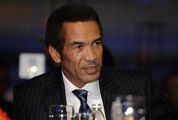Zuma’s delay is a knockout punch for NDP
by Michael Cardo,
2015-08-27 06:56:03.0
IT SHOULD come as no surprise that, more than four months after nominations closed for people to serve on the National Planning Commission, the Presidency has still not announced the successful candidates. The delay shows that President Jacob Zuma is not serious about implementing the National Development Plan (NDP).
The previous commissioners’ five-year term expired in May. The new commissioners will advise the government on "how best to implement" the NDP and develop "detailed plans in selected sectors" to drive economic growth. With no commission having been constituted, no wonder implementation of the NDP is at a standstill.
SA’s economy is heading for intensive care. Growth is contracting to levels far below the NDP’s target 5.4%. Mining and manufacturing are haemorrhaging jobs, and tourism is being bludgeoned into a coma by heavy-handed visa regulations.
Yet the one body that should be able to advise authoritatively on a rescue remedy, the National Planning Commission, has not been recomposed simply because Zuma appears to have no particular urgency, or indeed appetite, to confront the unfolding economic crisis.
To be sure, his dilatoriness also stems from doublethink at the heart of the African National Congress’s (ANC’s) developmental agenda. The ANC simultaneously holds on to two contradictory ideas about development. This results in policy incoherence and inaction in implementing the genuinely developmental NDP.
On the one hand, the ANC claims to believe in Amartya Sen’s notion of "development as freedom", the conceptual pillar of the NDP. For Sen, development is an expansion of the political and economic freedoms people enjoy, and removal of sources of "unfreedom". Development involves building people’s "capabilities" so that they can become active citizens and partners (not dependants) of a capable (but not dirigiste) state.
On the other hand, the ANC’s discussion documents for its national general council punt a "developmental state" whose role is to engineer a "second transition" towards "radical economic transformation" and the "national democratic society". In short, the ANC’s developmental state is interventionist, seeking to expand the role of the state in the economy. This kind of pseudodevelopmental thinking has manifested itself in policy documents such as the New Growth Path and the Industrial Policy Action Plan, as well as the latest draft black economic empowerment regulations, all of which are at odds with the NDP.
The responsibility for providing policy clarity on development rests with the Presidency and the National Planning Commission, whose commissioners it appoints. The Presidency sits at the apex of the government. So it should lead, not with doublethink, but with single-mindedness on development and the implementation of the NDP. However, it is hopelessly ineffectual on policy matters.
First, the Presidency is unwilling to do battle with the NDP’s main detractors, the Congress of South African Trade Unions and the South African Communist Party. Already, the NDP has been downgraded from a policy blueprint to a "living document not cast in stone".
Second, when the establishment of the National Planning Commission was first announced, Economic Development Minister Ebrahim Patel rushed to set up a rival panel of left-leaning economists to give him "advice on economic matters affecting SA’s development".
Third, regardless of whether or not he is reappointed National Planning Commission chairman, Deputy President Cyril Ramaphosa will be loath to champion an aggressive implementation of the NDP for, in doing so, he might alienate his alliance partners and thereby jeopardise his presidential prospects.
As for Zuma, all hope is lost there. The upshot is likely to be more developmental doublethink and a headlong rush into intensive care.
• Cardo is an MP and the Democratic Alliance’s spokesman on economic development
IT SHOULD come as no surprise that, more than four months after nominations closed for people to serve on the National Planning Commission, the Presidency has still not announced the successful candidates. The delay shows that President Jacob Zuma is not serious about implementing the National Development Plan (NDP).
The previous commissioners’ five-year term expired in May. The new commissioners will advise the government on "how best to implement" the NDP and develop "detailed plans in selected sectors" to drive economic growth. With no commission having been constituted, no wonder implementation of the NDP is at a standstill.
SA’s economy is heading for intensive care. Growth is contracting to levels far below the NDP’s target 5.4%. Mining and manufacturing are haemorrhaging jobs, and tourism is being bludgeoned into a coma by heavy-handed visa regulations.
Yet the one body that should be able to advise authoritatively on a rescue remedy, the National Planning Commission, has not been recomposed simply because Zuma appears to have no particular urgency, or indeed appetite, to confront the unfolding economic crisis.
To be sure, his dilatoriness also stems from doublethink at the heart of the African National Congress’s (ANC’s) developmental agenda. The ANC simultaneously holds on to two contradictory ideas about development. This results in policy incoherence and inaction in implementing the genuinely developmental NDP.
On the one hand, the ANC claims to believe in Amartya Sen’s notion of "development as freedom", the conceptual pillar of the NDP. For Sen, development is an expansion of the political and economic freedoms people enjoy, and removal of sources of "unfreedom". Development involves building people’s "capabilities" so that they can become active citizens and partners (not dependants) of a capable (but not dirigiste) state.
On the other hand, the ANC’s discussion documents for its national general council punt a "developmental state" whose role is to engineer a "second transition" towards "radical economic transformation" and the "national democratic society". In short, the ANC’s developmental state is interventionist, seeking to expand the role of the state in the economy. This kind of pseudodevelopmental thinking has manifested itself in policy documents such as the New Growth Path and the Industrial Policy Action Plan, as well as the latest draft black economic empowerment regulations, all of which are at odds with the NDP.
The responsibility for providing policy clarity on development rests with the Presidency and the National Planning Commission, whose commissioners it appoints. The Presidency sits at the apex of the government. So it should lead, not with doublethink, but with single-mindedness on development and the implementation of the NDP. However, it is hopelessly ineffectual on policy matters.
First, the Presidency is unwilling to do battle with the NDP’s main detractors, the Congress of South African Trade Unions and the South African Communist Party. Already, the NDP has been downgraded from a policy blueprint to a "living document not cast in stone".
Second, when the establishment of the National Planning Commission was first announced, Economic Development Minister Ebrahim Patel rushed to set up a rival panel of left-leaning economists to give him "advice on economic matters affecting SA’s development".
Third, regardless of whether or not he is reappointed National Planning Commission chairman, Deputy President Cyril Ramaphosa will be loath to champion an aggressive implementation of the NDP for, in doing so, he might alienate his alliance partners and thereby jeopardise his presidential prospects.
As for Zuma, all hope is lost there. The upshot is likely to be more developmental doublethink and a headlong rush into intensive care.
• Cardo is an MP and the Democratic Alliance’s spokesman on economic development




























Change: -2.60%
Change: -2.88%
Change: -2.44%
Change: -2.44%
Change: -5.26%
Data supplied by Profile Data
Change: 0.00%
Change: 0.00%
Change: -2.60%
Change: 0.00%
Change: 0.00%
Data supplied by Profile Data
Change: 1.98%
Change: -0.06%
Change: -0.19%
Change: -0.09%
Change: 0.57%
Data supplied by Profile Data
Change: 0.00%
Change: 0.00%
Change: 0.00%
Change: 0.00%
Change: 0.00%
Data supplied by Profile Data